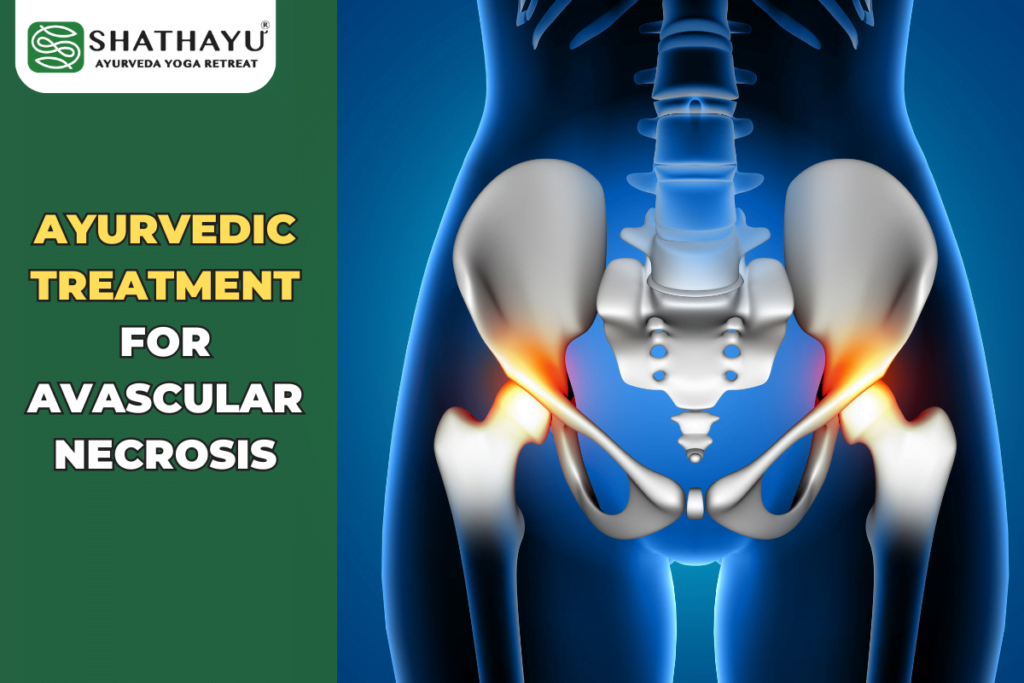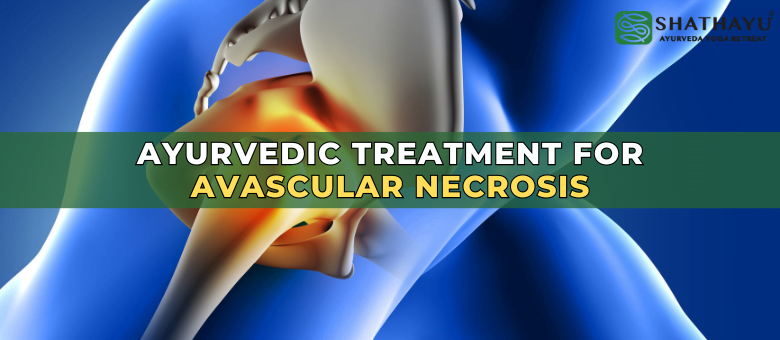Table of Contents

Introduction
Avascular Necrosis of the Femur, commonly known as AVN, is a debilitating condition that affects the hip joint, causing severe pain and limited mobility. This condition occurs when there is a loss of blood supply to the head of the femur (thigh bone), leading to bone tissue death. While conventional treatments like surgery may be recommended in advanced cases, Ayurveda offers holistic approaches that can help manage AVS, providing relief and potentially slowing down its progression. In this blog, we will explore the types, causes, and Ayurvedic treatments for AVN.
Types of Avascular Necrosis (AVN)
AVN can manifest in different forms, depending on the severity and location of the affected area. The two primary types of AVS are:
- Traumatic AVN: This type of AVS results from a traumatic injury, such as a hip dislocation or fracture. The injury disrupts the blood supply to the femoral head, leading to AVN.
- Non-Traumatic AVN: Non-traumatic AVN occurs without any apparent injury. It is often associated with underlying medical conditions or risk factors such as excessive alcohol consumption, corticosteroid use, and certain medical conditions like sickle cell disease.
Causes of Avascular Necrosis (AVN)
Understanding the underlying causes of AVN is crucial for effective treatment. Some common causes and risk factors include:
- Reduced Blood Flow: Anything that restricts or reduces blood flow to the femoral head can trigger AVN. This can be a result of blood vessel blockage or damage.
- Injury: Traumatic injury to the hip joint can disrupt blood supply, leading to AVN.
- Medications: Long-term use of corticosteroids, often prescribed for various medical conditions, can increase the risk of AVN.
- Excessive Alcohol Consumption: Heavy alcohol use can weaken bones and reduce blood flow to the femoral head.
- Medical Conditions: Certain medical conditions like sickle cell disease, lupus, and diabetes are associated with a higher risk of AVN.
Ayurvedic Treatment for Avascular Necrosis (AVN)
Ayurvedic Treatment for Avascular Necrosis (AVN) offers a holistic approach that includes various therapies and massages aimed at arresting its progression. Here are five Ayurvedic therapies for avascular Necrosis (AVN)
- Panchakarma Therapy for Avascular Necrosis: Ayurvedic Panchakarma Therapy is a comprehensive Ayurvedic detoxification process that aims to remove toxins from the body, improve circulation, and restore balance. Specific Panchakarma treatments for Avsacular Necrosis such as Basti (medicated enema like Tikataka skheerabasti) and Virechana (purging therapy), can be customized to address AVN and help halt its progression.
- Abhyanga (Ayurvedic Massage): Abhyanga is a traditional Ayurvedic massage that helps improve blood circulation, reduce inflammation, and alleviate pain in the affected joints. It can be tailored to focus on the areas affected by AVN.
- Sweda (Steam Therapy): Sweda or Steam for AVS involves exposing the body to therapeutic steam generated from Ayurvedic herbs. This therapy helps relax muscles, reduce stiffness, and promote blood flow to the affected joints, aiding in the healing process of AVN.
- Dhanyamla Dhara: A localized treatment for Pain conditions, which can be applicable in cases of AVN affecting the hip or knee joints. warm herbal oil is poured into it. This provides nourishment to the joint, reduces pain, and aids in halting AVN progression.
- Taila Dhara: Taila Dhara is a continuous stream of warm herbal oil poured over the affected area. This therapy is particularly beneficial for targeting AVN in specific joints. The continuous flow of oil helps improve circulation, reduce inflammation, and provide relief from pain.
The following steps are part of Ayurvedic Treatment for Avascular Necrosis:
Ayurveda, the ancient Indian system of medicine, offers a comprehensive approach to managing AVN. Ayurvedic treatment for AVN focuses on restoring balance to the body and mind, which can help alleviate pain and improve overall well-being. Here are some key aspects of Ayurvedic Treatment for Avascular Necrosis:
- Diet and Lifestyle: Ayurveda emphasizes the importance of a balanced diet and a healthy lifestyle. Patients with AVN are advised to follow dietary guidelines that include anti-inflammatory foods, such as ginger and turmeric, and to avoid foods that can exacerbate inflammation.
- Ayurveda Medicine for AVN: Ayurvedic practitioners may prescribe herbal medicines that have anti-inflammatory and bone-strengthening properties. Some commonly used herbs for AVS include Ashwagandha, Guggul, and Shatavari.
- Yoga and Physical Therapy: Specific yoga postures and physical therapy exercises can help improve hip joint flexibility and strength while reducing pain.
- Stress Management: Ayurveda recognizes the connection between stress and health. Stress management techniques such as meditation and deep breathing exercises can be incorporated into the treatment plan to promote overall well-being.
Conclusion of Ayurvedic Treatment for Avascular Necrosis
Avascular Necrosis can significantly impact a person’s quality of life, but Ayurveda offers a holistic approach to managing this condition. While Ayurvedic treatment for AVN can provide relief and improve mobility, it’s essential to consult with a qualified Ayurvedic doctor near you for AVN to create a personalized treatment plan tailored to your specific needs. With the right approach, Ayurveda can be a valuable complement to conventional medical treatments for AVN, offering hope for a better quality of life.
It’s essential to consult with a qualified Ayurvedic practitioner who can assess your individual condition and recommend a personalized treatment plan that may include a combination of these therapies. Additionally, Ayurvedic treatments should be pursued alongside any conventional medical advice you may receive for AVN to ensure a comprehensive approach to managing the condition.





More Stories
Ashwagandha’s Impact on Cortisol Levels in Stressed People
Health care cyberattack ‘likely one of the worst,’ expert says
Accessing Medicinal Cannabis in the UK: A Comprehensive Guide